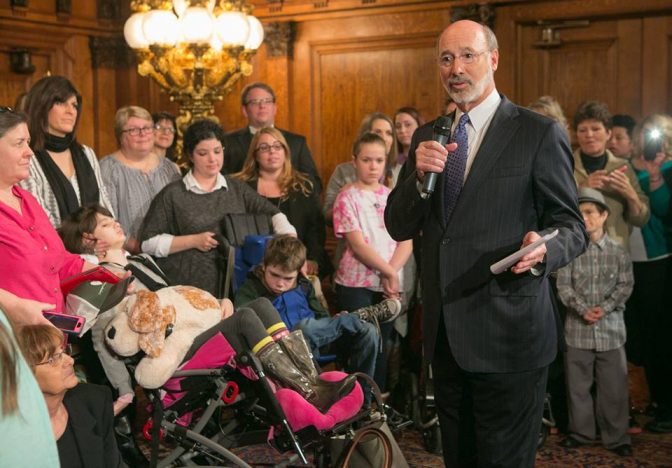Pennsylvania Legalizes Medical Marijuana With Limited Law

The Pennsylvania Senate and House held final votes this week passing a bill to legalize limited medical cannabis products for doctors to recommend to qualifying patients.
Governor Tom Wolf is set to the sign the bill during a ceremony on April 17.
«I am proud and excited to sign this bill that will provide long overdue medical relief to patients and families who could benefit from this treatment,» Wolf said in a statement. «I applaud members of both parties in the House and Senate who have come together to help patients who have run out of medical options and want to thank the thousands of advocates who have fought tirelessly for this cause.»
Advocates at the Keystone Cannabis Coalition, Campaign for Compassion, PittsburghNORML and PhillyNORML were pleased. But some were cautious.
Restrictive laws passed in New Jersey and New York have led to low patient registration numbers and high prices for legal products.
PA’s law will not allow smoking. Whole plant cannabis cannot, initially, be dispensed. Instead the state will license cultivators to grow cannabis that will then be taken by licensed processors, laboratories and, finally, dispensaries where a variety of extracted oils will be available. These oils can be used in making edible preparations or put into an e-cigarette type vaporizer.
Potential growers would need to pay a $10,000 application fee and a $200,000 fee to initially register if they are selected. They would also need to prove they have $2 million in assets, including $500,000 cash-on-hand to apply.
Patients must have one of a list of qualifying conditions: Cancer, HIV/AIDS, Parkinson’s Disease, ALS, Crohn’s Disease, Inflammatory Bowel Disease, Glaucoma, Epilepsy, Huntington’s Disease, Multiple Sclerosis, Intractable seizures, Damage to the nervous tissue of the spine, Neuropathies, Severe or Chronic or Intractable Pain, Autism, Sickle Cell Anemia, Intractable Spasticity and any terminal diagnosis.
In order to gain access to the program doctors and nurse practitioners, who receive special training and authorization from the DOH, will begin to register patients. It is unknown how long it will take to set up the practitioner registry.
The exact days when patient registration cards will be issued or even legal medical cannabis plants start growing in Pennsylvania is also unknown.
After Gov. Wolf signs the bill into law, it becomes effective in 30 days. That’s when the Department of Health starts an 18-month clock on getting program up and running.
DOH will oversee all aspects of the regulations being created, approved by the Independent Regulatory Review Commission (IRCC), and then implemented.
Right now there were some wild speculation as to the potential size of the medical cannabis products market. The Pa Senate Fiscal Note on the legislation estimated about 100,000 potential patients. Some advocacy groups like the Marijuana Policy Project put the number in the tens of thousands.
Yet the nature of the law and the significant unknowns in the upcoming regulations raise serious doubt as to whether this bill will achieve broad patient access.
New Jersey has registered just over 6,000 patients since their law was passed in 2010. Only about 2/3 are active in the program.
Numerous press reports in New York also indicate a difficult road to registration for patients and then exorbitant, out of pocket, costs for cannabis oils. Pennsylvania’s law will have some price controls but another unknown is to what comparison there will be for fair prices on cannabis products.
Politically this shift in Pa is definitely a victory of ideas. What remains unclear is if the law that was passed will work off of paper for a large population of patients or just a handful.

